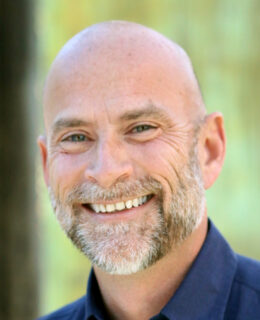Each month, we interview a human factors expert to get their take on the Human Factors and User Experience industry. In this month’s installment, Russ sat down with Gerard Torenvliet, Sr Manager of Human Factors and User Experience at Medtronic.
Russ: How did you get your start in Human Factors?
 Gerard: When I was in high school, my guidance counselors had trouble advising me on a path to take with my career. I was good at math (but didn’t necessarily like it), enjoyed science and physics, and really enjoyed writing and working with people. I didn’t feel like a typical engineer but it was hard finding something that hit all my strengths. (They recommended dentistry, which to me seemed absurd!) So, I started visiting career fairs. At one of them, in the middle of all the whiz-bang engineering displays, I found two guys sitting at a table in front of this picture: Beer seemed a lot more interesting than anything at the other tables, so I was drawn in for a conversation. These two guys turned out to be human factors people working in nuclear power plant design, and their passion was to design things well enough so that nuclear power plant operators didn’t have to take matters into their own hands and install beer taps to tell two previously identical levers apart. I was intrigued and learned how human factors could prevent big industrial accidents like Three Mile Island, and that psychology and engineering mixed pretty well. I was hooked.
Gerard: When I was in high school, my guidance counselors had trouble advising me on a path to take with my career. I was good at math (but didn’t necessarily like it), enjoyed science and physics, and really enjoyed writing and working with people. I didn’t feel like a typical engineer but it was hard finding something that hit all my strengths. (They recommended dentistry, which to me seemed absurd!) So, I started visiting career fairs. At one of them, in the middle of all the whiz-bang engineering displays, I found two guys sitting at a table in front of this picture: Beer seemed a lot more interesting than anything at the other tables, so I was drawn in for a conversation. These two guys turned out to be human factors people working in nuclear power plant design, and their passion was to design things well enough so that nuclear power plant operators didn’t have to take matters into their own hands and install beer taps to tell two previously identical levers apart. I was intrigued and learned how human factors could prevent big industrial accidents like Three Mile Island, and that psychology and engineering mixed pretty well. I was hooked.
Russ: As someone who leads a large medical device manufacturer HF team, what advice can you share with start-up or mid-sized medical device manufacturers in terms of their own human factors strategy?
Gerard: Even though we have some great standards that could be used to motivate our work, my strongest advice in terms of strategy is to make sure that standards-compliance is never made the objective of your work. If your strategy is about standards compliance, then Human Factors turns into a cost to be minimized instead of an opportunity to be maximized. In my discussions with leadership, I always emphasize that Human Factors is about getting to a great design that will be good for the business, and that through good design we also get standards compliance almost for free.
Russ: What are some of the biggest challenges you’ve seen recently within the HF industry? What are some ways that we can overcome those challenges?
Gerard: Two challenges out there really motivate me. The first one relates to mobile devices and to the incredible pressure to extend, especially smart phones, into the medical device realm. Until now, an important tool for making safe experiences has been to close the platform. At Medtronic we provide patients with home monitoring devices that we fully design, manufacture, provide, and maintain. Some of our patients would rather see us provide these monitoring tools via their smartphone, but how can we do this safely when we don’t control the whole experience? For example, what happens if people turn off critical notifications? Solutions here will be enabled by good design and will involve collaboration between device makers, smartphone makers, and regulatory agencies. The second challenge relates to chronic disease. The medical profession has done a good job at minimizing the number of things that can kill us quickly, so now chronic diseases are even more of an epidemic. The best solutions to the costliest chronic diseases are about behavior change (diet, exercise, adherence to a doctor’s instructions) and not just pills and devices. Behavior change is something that the human factors profession is in a unique position to effect.
Russ: Looking forward to 2018, what growth plans do you have for your own HF team at Medtronic?
Gerard: My team is understaffed right now, and we are up to 50% leveraged with contractors. So, I’m in constant growth mode. If I could find 5-7 really great people, I’d hire them.
Russ: What are some of the qualities and skills that you look for when hiring a HF professional?
Gerard: It’s great that so many of the Human Factors professionals out there have consulting experience, because what we need are great in-house consultants, strong at business development, relationship management, planning and project management, and project execution. Those are fundamental. On top of that, I’m looking for people who have a passion for product development (and not just regulatory compliance), who have the stamina to negotiate creativity and innovation into a product over the long haul, and who can bring consumer design perspectives into our highly engineering-oriented culture.
 Gerard Torenvliet, Sr Manager of Human Factors & User Experience, Medtronic
Gerard Torenvliet, Sr Manager of Human Factors & User Experience, Medtronic
Gerard is the Senior Manager of Human Factors & User Experience at Medtronic Cardiac Rhythm and Heart Failure. He has Bachelor’s and Master’s degrees, both specializing in Human Factors. Prior to working at Medtronic, he ran a small Human Factors consultancy specializing in military human factors, and worked as a Human Factors designer and researcher in aerospace, business software, and nuclear power.




